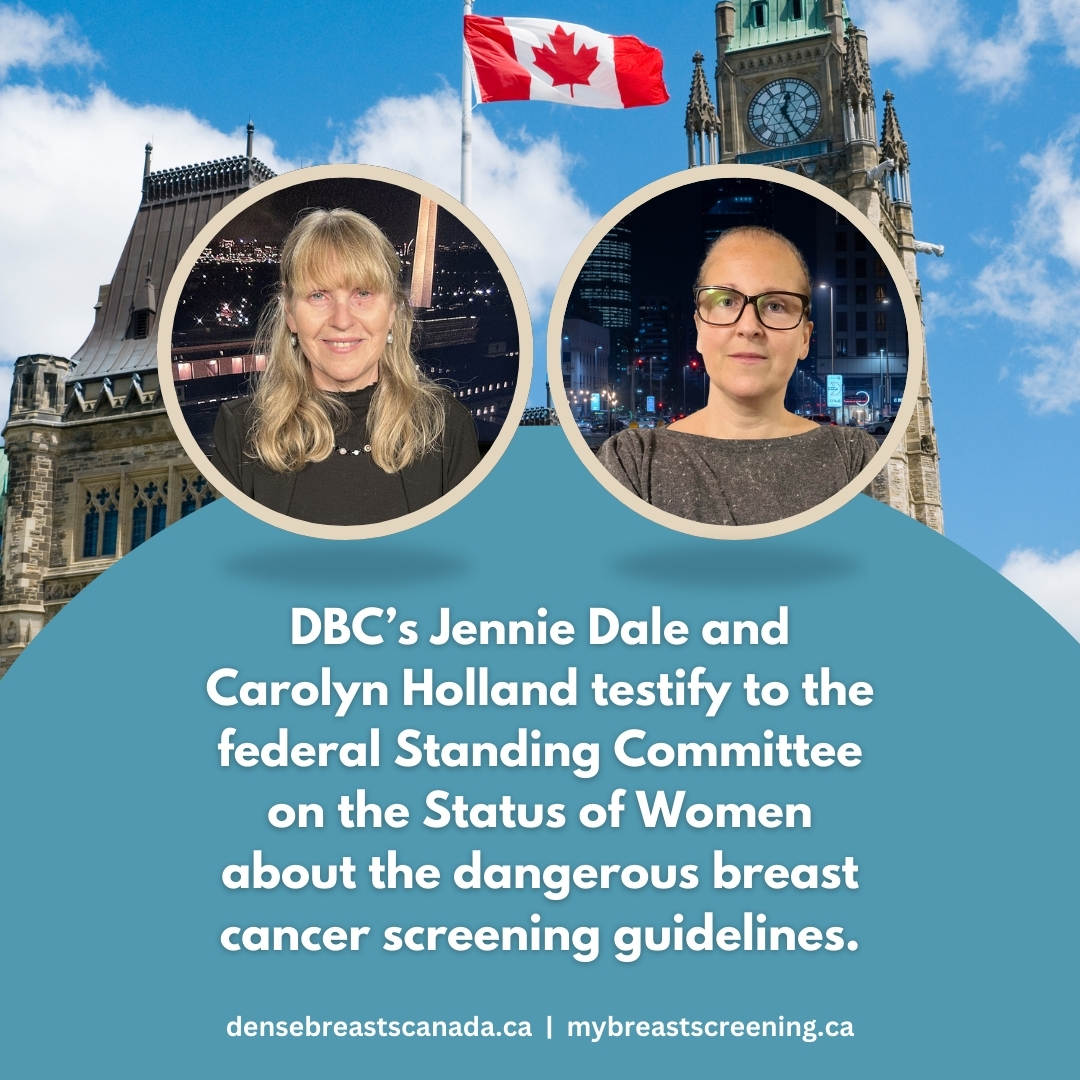Testimony to Status of Women Committee Oct 9, 2024

Testimony by Dense Breasts Canada: Carolyn Holland and Jennie Dale
My name is Carolyn Holland, and I am here today, not just as a 46-year-old breast cancer patient, but as a mother, wife, sister, daughter, colleague, and friend.
As a volunteer with Dense Breasts Canada advocating for earlier screening, I’m thrilled that Ontario lowered the age to 40 yesterday. Unlike the Canadian Task Force on Preventive Health Care, Ontario listened to experts and followed current evidence. I’m excited for women to have the opportunity to detect cancer early and avoid the lifelong repercussions I face from not having had that chance.
My doctor never raised the topic of screening in my 40s, and by the time I discovered a lump at the age of 43, the cancer had already spread to my lymph nodes. My life has been forever changed by these dangerously outdated guidelines.
The 2024 guidelines are similar to those my family doctor followed three years ago. I am concerned that recent gains from more provinces adopting self-referral at 40 will be undermined by the ongoing influence of misinformation from the Task Force which may dissuade women from screening.
Task Force representatives insist that women discuss the so-called ‘harms’ and the benefits of mammograms with their doctors before booking. Informed decision making requires accurate information, yet, doctors are not being instructed to tell women the truth—that cancers in the 40s are often more aggressive, with the highest years of life lost to women diagnosed in the 40s.
Instead, doctors are instructed to say that the risk of breast cancer is low in this age group and that screening is less beneficial than for older women. They share the Task Force’s exaggerated harms of “false positives,” which are really just callbacks for more images and they flag theoretical overdiagnosis, a risk that is minimal for women in their 40s.
Doctors also rely on the Task Force’s 1000-person tool, but its flawed one-size-fits-all approach ignores personal risk factors like ethnicity, family history, and breast density. The only benefit this tool considers is the decreased risk of dying of breast cancer, but not the years of life gained or the benefits of avoiding mastectomy and chemotherapy. It presents women with a limited view of the benefits of screening over the next 10 years, instead of the much greater lifetime benefits. This messaging misguides doctors and patients and denies women the full picture they deserve to make a truly informed decision.
As long as the Task Force guidelines remain unchanged, Canadian women will continue to receive misleading information that downplays the life-saving benefits of early detection.
Jennie:
This misinformation campaign extends beyond doctors’ offices to the way the Task Force frames its methods, communicates in public forums, and dismisses legitimate concerns.
The Task Force misled the public by claiming that experts were meaningfully included in the guideline update process. Expert advisors revealed that their input was often dismissed, with the Task Force dictating which evidence to consider, including outdated trials from 40–60 years ago that don’t reflect current technology or treatment advancements.
These experts were excluded from voting on the guidelines. The Task Force casted doubt on the integrity of these experts, in the media, by suggesting they have conflicts of interest. The Task Force claimed only its members are neutral. In reality, even before the evidence review began, the Task Force co-chair stated to the media that the guideline against screening in the 40s did not need to change. This resulted in a predetermined outcome, orchestrated by a panel with a troubling anti-screening bias. PHAC refused to remove the co-chair despite repeated evidence of her lack of objectivity.
The Task Force would have Canadians believe that early cancer detection is unimportant because we have effective treatments. In reality, the stage of diagnosis is critical to survival, regardless of treatment advancements. Data from Statistics Canada contradicts the Task Force’s claims—when aggressive triple-negative cancer is detected at Stage One, the five-year survival rate is 96%, but at Stage Four, it plummets to 7%. Early detection is life-saving.
The Task Force misleads Canadians by claiming it included current evidence in its update. In reality, its grading system undervalues current observational studies, as well as studies which highlight critical trends like the rising incidence of breast cancer in younger women and racial disparities. The U.S. Task Force recognized the credibility of this evidence and lowered the screening age to 40.
Although our Task Force acknowledged many ethnic groups face earlier onset and higher mortality rates from breast cancer, it chose to leave the guidelines unchanged and discriminatory, calling for more research while ignoring the existing data that demands immediate action.
Our examples show how the Task Force misleads the public and healthcare professionals, operating without accountability, ethical oversight, and scientific integrity. The evidence for screening at 40 is irrefutable. Current guidelines must be suspended and revised to reflect modern, inclusive evidence. We must act now to stop avoidable late-stage breast cancer diagnoses and needless loss of life.
Thank you for the honour of testifying to you today and for all you are doing to protect the well-being of Canadians.
